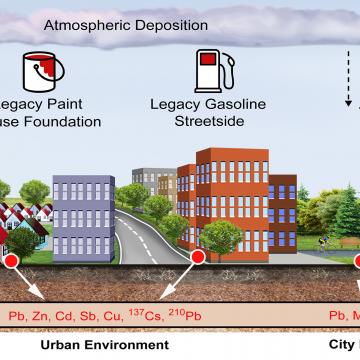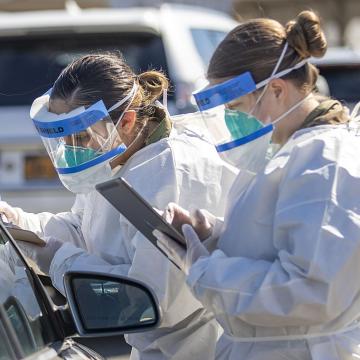-
NewsThe anti-fogging sprays and cloths many people use to prevent condensation on their eyeglasses when wearing a mask or face shield may contain high levels of per- and polyfluorinated alkyl substances (PFAS), a new Duke University-led study finds.
-
NewsBy distinguishing between lead from modern sources and lead from pre-1970s vehicle exhaust fumes and leaded paint, the new test may be especially useful for assessing the hidden risks of legacy contamination.
-
NewsNew funding will help speed the development of an early-warning system that can predict the probability of malaria outbreaks occurring up to 12 weeks in advance, giving local officials time to put controls in place to prevent or curb the disease’s transmission.
-
NewsClouds of smoke and ash from wildfires that ravaged Australia in 2019 and 2020 triggered widespread algal blooms in the Southern Ocean thousands of miles downwind to the east, a new Duke University-led study by an international team of scientists finds.
-
NewsMost people are likely to experience an extreme pandemic like COVID-19 in their lifetime, a new study shows.
-
NewsWarming waters along the Western Antarctic Peninsula have led to declines in the diversity and distribution of the region’s plankton population and its ability to absorb climate-warming carbon dioxide from the atmosphere.
-
NewsScientists at Duke University have developed a suite of four new tests that can be used to detect coal ash contamination in soil with unprecedented sensitivity.
-
NewsDecades after federal bans ended widespread use of lead-based paint and gasoline, some urban soils still contain lead levels that exceed safety guidelines for children.
-
NewsHarnessing the power of artificial intelligence, satellites and field observations, Duke researchers have produced new estimates of how much photosynthesis and primary production – key components in the global carbon cycle – are occurring in Earth’s oceans, and how these processes may be changing in response to a changing climate.
-
NewsThe proliferation of pits and ponds created in recent years by miners digging for small deposits of alluvial gold in Peru’s Amazon has dramatically altered the landscape and increased the risk of mercury exposure for indigenous communities and wildlife, a new study shows.
-
NewsThe stringent lockdown imposed by the Chinese government to slow the spread of COVID-19 early this year significantly eased the strain on hospitals there. Admissions due to non-COVID respiratory illnesses decreased by nearly 5,000, a new study by an international team of scientists shows.
-
NewsA new Duke University-led analysis shows that during the early months of the COVID pandemic, the average number of new infections caused by an infected individual (i.e. the basic reproduction number, R0) was 4.5, or more than twice as many as the initial 2.2 rate estimated by the World Health Organization at the time.
-
NewsDuke University researchers have developed a new online calculator that teachers, administrators and students can use to estimate the risk of airborne transmission of the COVID-19 virus in classrooms.
-
NewsGovernments might be able to prevent future pandemics by investing as little as $22 billion a year in programs to curb wildlife trafficking and stem the destruction of tropical forests, a new analysis by an international team of scientists and economists shows.
-
NewsMan’s best friend may also be man’s best bet for figuring out how environmental chemicals could impact our health. Researchers from North Carolina State University and Duke University’s Nicholas School of the Environment used silicone dog tags as passive environmental samplers to collect information about everyday chemical exposures, and found that dogs could be an important sentinel species for the long term effects of environmental chemicals.














